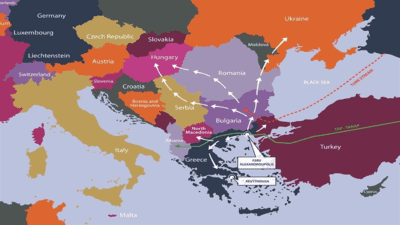The largest city in the Eastern Macedonia and Thrace region, Alexandroupolis, is developing into a major energy hub and a pillar of security and stability, enhancing Greece’s multidimensional cooperation with the US, EU, and NATO.
Strategically located at the easternmost border of Greece and the EU, at the converging point of two continents, the Alexandroupolis port offers exceptional advantages for the region’s transformation into major energy, logistics, and transportation centre, placing it at the epicentre of economic growth.
The port’s cargo terminal connection with the railroad, the Alexandroupolis Democritus Airport situated only three miles away, and the new Egnatia Highway, provides the needed transportation infrastructure for the port to serve as the major transportation hub in the area.
While visiting the Alexandroupolis port this past December, Foreign Minister Nikos Dendias stated that "from the beginning, in 2019, we set three guiding pillars. The first one is defence.
That, I believe, is fully served through the two Agreements we signed with the US, the MDCA and its amendment. The port of Alexandroupolis has been included in the planning, and thus serves, in the truest sense, the Greek, national interest. Apart from that, there is a trade and economic aspect.
This port will evolve, will become a port of entry into Central and Eastern Europe, and play an extremely important role for the city and the region in the years to come. And the third aspect, which is in no respect less important, is energy. The new liquefied natural gas terminal that will be built a few miles from here and the interconnection with TAP, will result in Alexandroupolis, and Thrace, becoming a new energy hub. And this as a whole serves the new vision for our country.
A country interconnected, with strong defence capacity, sovereign, with a bright economic future in a prosperous Europe."
The US-Greece Mutual Defense Cooperation Agreement (MDCA) and the Second Protocol of Amendment of the MDCA further safeguard Greece’s interests in establishing a protective shield for the area, and the strategically situated port has already become a critically important transportation and logistics hub for NATO military operations in the Balkans and Eastern Europe. In 2021, during the Defender-Europe 2021 and Operation Atlantic Resolve military exercises, the Alexandroupolis port was used by the US and other allies to transport military equipment and forces.
The port is also important to the region’s energy security, diversification, and transition to clean energy.
The Alexandroupolis Independent Natural Gas System (INGS) project, which comprises an offshore floating unit for the reception, storage, and re-gasification of LNG (FSRU), a system of a subsea and onshore gas transmission pipeline, will be connected to the Greek National Natural Gas System (NNGS), the Natural Gas Interconnector Greece-Bulgaria (IGB) and the Trans Adriatic Pipeline (TAP).
This will make the Alexandroupolis port a major supplier of clean energy in Greece, Southeast Europe and farther. In January, Gastrade SA shareholders made the Final Investment Decision (FID) for the construction of the Independent Natural Gas System (INGS) of Alexandroupolis.
Furthermore, privatization of the Alexandroupolis port is important since the port needs new investments so that it may be transformed into a modern, productive, and functional port.
The tender, which concerns the sale of at least 67% of Port Authority’s shares by the Hellenic Republic Asset Development Fund (HRADF), is now on the home stretch, with binding offers to be submitted towards the end of April. Four bidders are currently shortlisted.
Source Greece In America, the official newsletter of the Embassy of Greece in Washington; images ©ANA-MPA)


